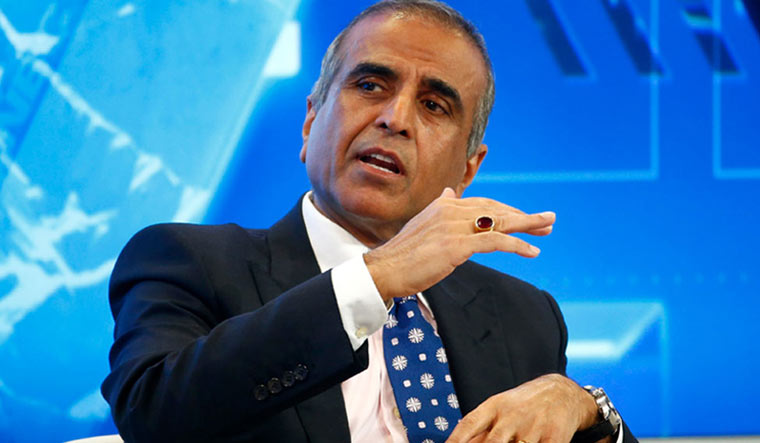A day after announcing capital-raise of Rs 21,000 crore via a rights issue, telecom czar Sunil Bharti Mittal on Monday made a passionate pitch for hike in tariffs and a cut in government levies to save the industry.
Mittal, the chairman of India's second largest telecom company Bharti Airtel, said while 35 per cent of industry's revenue goes to the government in taxes and levies, telcos are loaded with an extraordinary debt of AGR (Adjusted Gross Revenue) dues and spectrum payments.
"People are consuming average 16GB of data per user per month. It is time that tariffs do take a tick up to make the industry viable and, more importantly, have decent and appropriate returns on capital to grow into more technology areas, to roll out more networks, and become more viable model of sustainability in the future," Mittal said.
He stressed that the industry needs to have "right economic model", and rued that "for far too long, we have played in this game by growing this industry at a very minimal pricing level".
Levies are far too high in the telecom sector, Mittal said adding that "levies and load on industry needs to be brought down" for India to truly realise its digital vision. Mittal made it clear that Airtel will not shy away from raising tariffs. He argued that tariff changes effected by Airtel over the last few months are a "testimony" that the company has indeed "run out of patience".
In a rare move, the Bharti Airtel Ltd chairman attended about an hour-long investor call, answering queries related to the rights issue as well as those pertaining to the telecom sector.
Asked if Airtel will take a lead in raising tariffs in future, Mittal said that the company has already been doing it in a limited manner by pushing up base tariffs to Rs 79.
"Can this go to Rs 99 eventually, my answer is yes, the question is when...In the end, we are also bound by market forces, we can't be outlier beyond a point. You can be having some premium given strength of the brand but you can't go beyond a point where you start to hurt yourself," Mittal observed.
Airtel will be "vigilant" and "happy to take small baby steps which could even be first and foremost compared to others", he pointed out.
The industry needs to move "very quickly" to ARPU (Average Revenue Per User) of Rs 200 per user per month.
"This industry needs to survive and thrive, we need to get to Rs 200 within this financial year. Eventually this industry needs to be at Rs 300 per user per month and, in that, you can enjoy tons of data...music, entertainment, should be available to customers...we will put in a lot of stuff, but we need to get to Rs 200 points and eventually to Rs 300," he contended.
The industry is granular and segmented, where some customers could to be at a price point of Rs 100 with small amount of data snacking while at other end of spectrum customers could go to Rs 600-800 levels enjoying multiple offerings.
"...even then, the tariffs in this country will be lower than anywhere in the world," Mittal said.
Mittal exuded confidence that the industry has seen worst in terms of tariff wars and ARPU contraction.
"In September 2016, at the launch of new powerful competitor, we had gone below Rs 100, we are at a mid point...about Rs 145-150...this will start to trend towards Rs 200 within this financial year," Mittal said.
The comments came a day after Bharti Airtel's board approved raising up to Rs 21,000 crore by way of the rights issue, at a price of Rs 535 per share.
Airtel hopes that the fund raising would be gamechanger for the company, giving it the firepower to accelerate beyond "business as usual" by grabbing a larger marketshare of mobile services (including agressive positioning on 5G roll outs), fibre to the home and data centres business.
"As we respond to Government's call to invest more money, accelerate digital vision of India, we also equally expect Government also to respond by having lighter touch regulation, by making life simple for telecom companies. About Rs 35 of every Rs 100 that telcos generate as revenue go into Government levies," he said.
It is pertinent to mention here that while Reliance Jio has been cementing its lead in the fiercely-competitive Indian telecom market, Vodafone Idea (VIL) is facing existential issues. In fact, industry analysts have sounded an alarm over the risks of Indian telecom market turning into a duopoly.
Billionaire Kumar Mangalam Birla recently stepped down as chairman of Vodafone Idea Ltd, within two months of offering to hand over Aditya Birla Group's stake in the telco over to the government, in a bid to avert a crisis for the telecom company.
The total gross debt (excluding lease liabilities and including interest accrued but not due) as of June 30, 2021 of VIL stood at Rs 1,91,590 crore, comprising of deferred spectrum payment obligations of Rs 1,06,010 crore and adjusted gross revenue (AGR) liability of Rs 62,180 crore that are due to the government. PTI MBI MKJ 08301920





